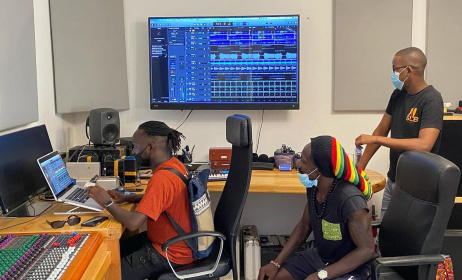Kenyan artist sues politician over campaign jingle
A Kenyan musician has begun legal action against a politician over alleged copyright infringement.
 Patrick Wainaina, seen campaigning in this photo, is being sued by artist John Kamau.
Patrick Wainaina, seen campaigning in this photo, is being sued by artist John Kamau.
In a statement issued by his lawyers this week, John Kamau objected against Kiambu County gubernatorial candidate Patrick Wainaina’s use of the ‘Tusonge Mbele na UDA’ jingle during his campaign ahead of the 9 August general elections.
“Those who have watched his campaign advertisements know he is using my jingle,” Kamau said. “It is sad that a leader who claims to be championing for economic empowerment, especially among the youth, would make use of a young producer’s sweat so wantonly and without regard. Wainaina’s actions reflect poorly on him as a leader and aspiring gubernatorial candidate.”
Kamau’s legal team says it reached out to Wainaina to settle the matter out of court without success. The lawyers added that their letters has neither been acknowledged nor responded to.
“Our client has since instituted takedown proceedings against the song on Jungle TV, the candidate’s YouTube page, and hereby forewarns any and all stations playing this song,” they said. “The action of airing the song constitutes copyright infringement and our client will not hesitate to lay a claim against those broadcasting or streaming this song.
“Therefore, those engaging in the said actions have been granted 48 hours to take it down and remove the campaigns of their respective broadcasting schedules until this matter is resolved. Meanwhile, our client will be proceeding to court to institute a copyright infringement matter.”
The court will now investigate where the copyright lies and assess compliance with regard to the Copyright Act.
Leading Nairobi-based intellectual property lawyer Elizabeth Lenjo says Kenya’s Copyright Act is clear about the rights granted to copyright holders and the control they have over their works. “Failure to get such permission from the rightsholder amounts to copyright infringement,” she said.
Asked why the politician seems to be disregarding calls to resolve the matter, Lenjo said many political figures did not regard copyright as a matter of importance.
“As such, when citizens should come together to hold their leaders accountable, the opposite happens,” Lenjo said. “They turn against each other and forget we should be having a conversation about what is right and what is wrong.
“In 2013, we handled a copyright infringement case against a politician who was running for office and we were met with hostility and even death threats. It is a very bizarre way of dealing with disputes. In other countries – like South Africa, the UK and US – compliance and respect for copyright is much higher. I’ve had copyright infringement disputes in some of these jurisdictions, though not with politicians, and we settled them expediently and amicably. Something I marvel about every day.”
So what must be done to put an end to copyright infringements in Kenya? “We need to empower specialised courts or tribunals, broaden their mandate and ensure that intellectual property rights in the creative industries are upheld. These specialised courts or tribunals have the power to guide the higher courts in the event there are appeals against their decisions. I believe we also need to find more stringent ways to hold copyright violators accountable, especially those with influence and perceived higher power,” Lenjo said.



























Commentaires
s'identifier or register to post comments